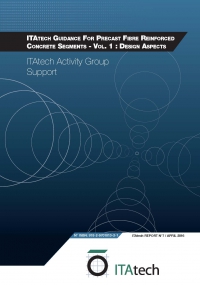This document has been written to assist tunnel designers, contractors and owners in
understanding the benefits of and limitations in the use of fibre reinforcement for precast
concrete segments for tunnel linings, installed using tunnel boring machines. Guidance is also
provided on specifications and testing.
Fibres can be used as reinforcement in precast concrete segmental tunnel linings, either, most
commonly, as “fibre only” (as ‘Primary’ reinforcement) or in combination with conventional (bar)
reinforcement - a “combined solution” (as ‘Secondary’ reinforcement). The state of the art is
defined by a large number of reference projects, where fibre reinforced concrete (FRC) segments
have been used successfully. Projects using FRC segments report the following benefits of its
use:
• Excellent durability;
• Damage due to handling and installation is minimized;
• Performance in the relevant Ultimate and Service Limit States (ULS and SLS) can be reliably
demonstrated;
• Reduced damage of segments;
• Overall manufacturing costs are lower than for conventionally reinforced concrete.
• A lower carbon footprint
However, their application in this field has been stifled due to the limited, or even absent,
regulatory framework covering this type of product. With the publication of standards specifically
dealing with fibre properties, and international design guidelines such as the Model Code 2010,
edited by fib, this obstacle has been overcome.
Many research studies and full scale tests on the behaviour of fibre reinforced concrete have
been carried out in recent years in various countries. They have greatly contributed to a better
characterization of FRC, thereby providing a better understanding of the behaviour of this
material and allowing projects to set specific minimum performance requirements.
The aim of this document is to present the common understanding of designers, manufacturers
and users of fibre reinforced concrete segments of what constitutes good practice in this field
of engineering. This is the first edition of what is intended to be a “live document”. ITAtech
welcomes all feedback on this document and has plans to keep this
document up to date as well as publishing guidance on production aspects of FRC.


